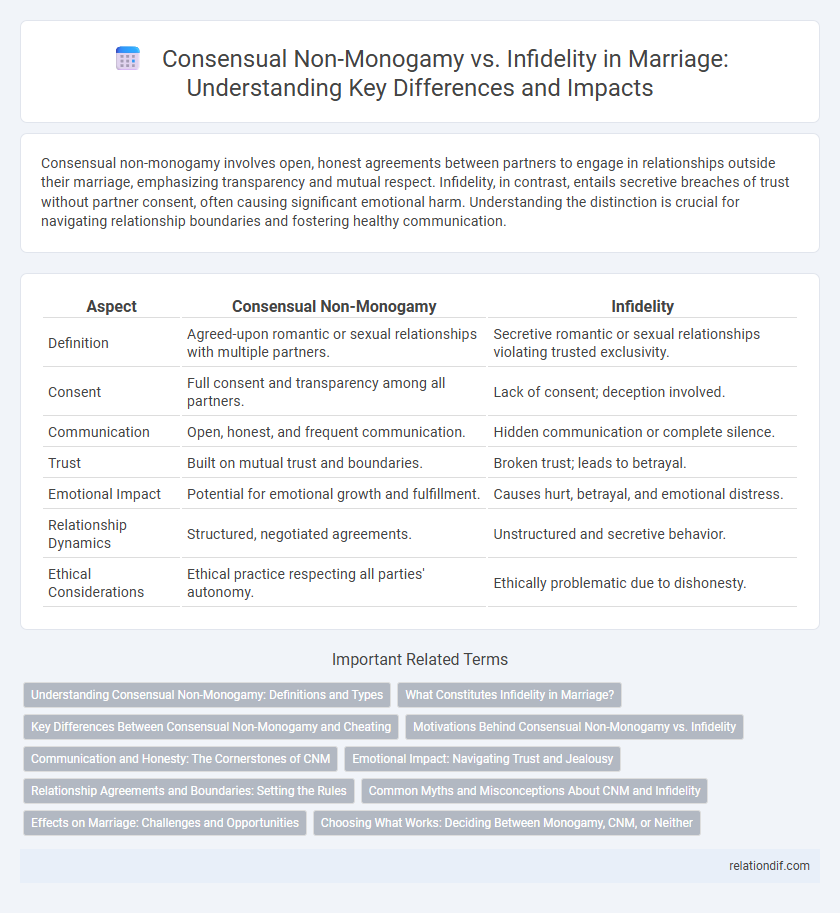Consensual non-monogamy involves open, honest agreements between partners to engage in relationships outside their marriage, emphasizing transparency and mutual respect. Infidelity, in contrast, entails secretive breaches of trust without partner consent, often causing significant emotional harm. Understanding the distinction is crucial for navigating relationship boundaries and fostering healthy communication.
Table of Comparison
| Aspect | Consensual Non-Monogamy | Infidelity |
|---|---|---|
| Definition | Agreed-upon romantic or sexual relationships with multiple partners. | Secretive romantic or sexual relationships violating trusted exclusivity. |
| Consent | Full consent and transparency among all partners. | Lack of consent; deception involved. |
| Communication | Open, honest, and frequent communication. | Hidden communication or complete silence. |
| Trust | Built on mutual trust and boundaries. | Broken trust; leads to betrayal. |
| Emotional Impact | Potential for emotional growth and fulfillment. | Causes hurt, betrayal, and emotional distress. |
| Relationship Dynamics | Structured, negotiated agreements. | Unstructured and secretive behavior. |
| Ethical Considerations | Ethical practice respecting all parties' autonomy. | Ethically problematic due to dishonesty. |
Understanding Consensual Non-Monogamy: Definitions and Types
Consensual non-monogamy (CNM) encompasses relationship structures where partners agree to engage romantically or sexually with others outside the primary partnership, distinguishing it from infidelity, which involves deceit and breach of trust. Common types of CNM include polyamory, open relationships, and swinging, each with distinct boundaries and communication rules tailored to the couple's preferences. Clear consent and transparent communication are essential components that define and sustain CNM, fostering trust and mutual respect compared to the secrecy inherent in infidelity.
What Constitutes Infidelity in Marriage?
Infidelity in marriage is typically defined by a breach of agreed-upon boundaries, wherein one partner engages in romantic or sexual activities outside the commitment without the other's consent. Unlike consensual non-monogamy, which involves mutual agreement and clear communication about extramarital interactions, infidelity undermines trust by violating the explicit or implicit terms of the relationship. Key indicators of infidelity include secrecy, deception, emotional distance, and unmet expectations within the marital contract.
Key Differences Between Consensual Non-Monogamy and Cheating
Consensual non-monogamy involves open communication, mutual agreement, and transparency between partners, emphasizing trust and respect within the relationship. Cheating or infidelity, however, is characterized by secrecy, deception, and violation of agreed-upon boundaries, leading to a breach of trust. The key difference lies in consent and honesty, where consensual non-monogamy is an agreed-upon arrangement, while infidelity involves betrayal and lack of consent.
Motivations Behind Consensual Non-Monogamy vs. Infidelity
Motivations behind consensual non-monogamy center on mutual agreement, open communication, and the desire for diverse emotional or physical connections without deception. In contrast, infidelity often stems from unmet needs, secrecy, and a breach of trust that damages the foundational commitment in marriage. Understanding these differing motivations is essential for addressing relationship dynamics and fostering healthy partnerships.
Communication and Honesty: The Cornerstones of CNM
Consensual non-monogamy (CNM) thrives on open communication and honesty, establishing clear boundaries and mutual consent among all partners involved. Unlike infidelity, which is characterized by secrecy and betrayal, CNM prioritizes transparency to foster trust and emotional security. Effective communication in CNM strengthens relationship satisfaction and supports the psychological well-being of everyone, setting it apart from the destructive patterns of infidelity.
Emotional Impact: Navigating Trust and Jealousy
Consensual non-monogamy fosters open communication and mutual agreement, which helps build trust and manage jealousy effectively within a marriage. Infidelity, by contrast, breaches the foundation of trust, often leading to emotional trauma, insecurity, and prolonged jealousy. Couples practicing consensual non-monogamy develop emotional resilience through transparency, whereas infidelity commonly results in significant relational damage and emotional distress.
Relationship Agreements and Boundaries: Setting the Rules
Consensual non-monogamy relies on clearly defined relationship agreements and boundaries that all partners openly negotiate and accept, ensuring mutual respect and trust. These agreements often encompass guidelines on emotional and physical interactions outside the primary partnership, varying widely to meet individual couple's needs. In contrast, infidelity breaks established boundaries without consent, undermining trust and destabilizing the relationship's foundation.
Common Myths and Misconceptions About CNM and Infidelity
Consensual non-monogamy (CNM) is often mistakenly equated with infidelity, but CNM involves open agreements between partners, whereas infidelity breaches trust without consent. Common myths suggest CNM causes relationship instability, yet studies indicate many CNM arrangements report high relationship satisfaction and effective communication. Misconceptions also portray infidelity as a symptom of dissatisfaction, while research shows motivations vary widely, including emotional needs and opportunity rather than solely unhappiness.
Effects on Marriage: Challenges and Opportunities
Consensual non-monogamy fosters open communication and trust, challenging traditional monogamous norms while offering opportunities for enhanced emotional intimacy and personal growth within marriage. In contrast, infidelity often leads to betrayal, diminished trust, and emotional distress, posing significant threats to marital stability and satisfaction. Navigating consensual non-monogamy requires boundaries and mutual agreement, potentially strengthening marital resilience compared to the clandestine nature and secrecy associated with infidelity.
Choosing What Works: Deciding Between Monogamy, CNM, or Neither
Consensual non-monogamy (CNM) emphasizes open communication and mutual agreement, distinguishing it sharply from infidelity, which involves secrecy and betrayal. Couples deciding between traditional monogamy, CNM, or neither must evaluate their core values, emotional needs, and boundaries to ensure relationship satisfaction and trust. Research indicates that successful CNM relationships rely on clear consent and ongoing negotiation, contrasting with the psychological harm often linked to infidelity.
Consensual non-monogamy vs Infidelity Infographic

 relationdif.com
relationdif.com